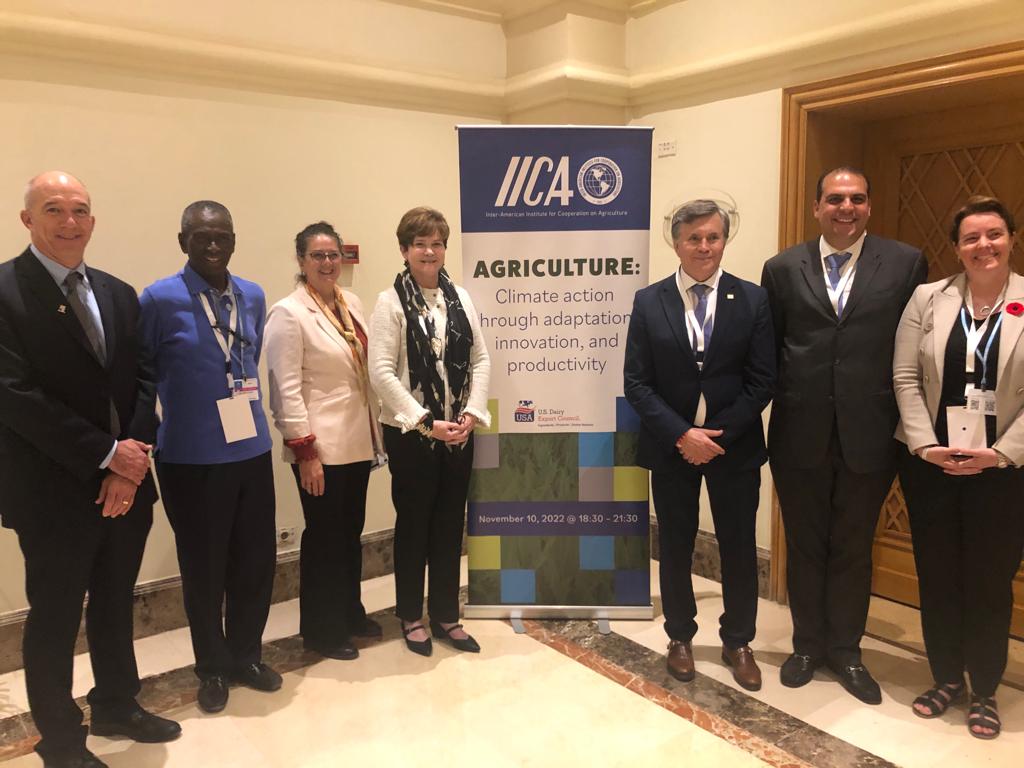Representatives of the industry and of the public sector made it clear that climate change mitigation and adaptation are a priority for a sector that is a key player, not only in global food security, but also in the economic and social sustainability of the hemisphere.

Sharm El-Sheikh, Egypt, 11 November 2022 (IICA) – The dairy industry of the Americas made a presentation at COP27, in the pavilion of the Inter-American Institute for Cooperation on Agriculture (IICA), outlining the various measures it has taken to increase its sustainability.
Representatives of the industry and of the public sector made it clear that climate change mitigation and adaptation are a priority for a sector that is a key player, not only in global food security, but also in the economic and social sustainability of the hemisphere.
The Home of Sustainable Agriculture of the Americas pavilion is a facility that IICA, with the support of its member countries and international partners, has mounted at the United Nations Climate Change Conference, which is currently taking place in Egypt. The Summit boasts an attendance of 33,000 accredited participants from almost 200 countries.
The pavilion is demonstrating to the world how the agriculture sector of the Americas is contributing to food security and the environmental protection of the planet.
The event, entitled “Sustainable and Climate-Smart Dairy Production”, was organized by the United States Dairy Export Council, with President and CEO, Krysta Harden serving as moderator.
The panelists included Donald Moore, Executive Director of the Global Dairy Platform (GDP); Caroline Emond, Director General of the International Dairy Federation; Cecilia Jones, Coordinator of the Sustainability and Climate Change Unit of the Ministry of Agriculture, Livestock and Fisheries of Uruguay; and Marilyn Hershey, a dairy producer from the United States.
Uruguay’s Minister of Livestock, Agriculture and Fisheries, Fernando Mattos, gave the opening remarks along with IICA Director General, Manuel Otero. Mattos stressed the importance of ensuring that the voice of the agriculture sector of the Americas is heard amidst the climate discussions, so that it will be able to provide a clear picture of its production methods. Otero, on the other hand, maintained that all decisions in relation to agrifood systems should be science-based and that agriculture should be considered as part of the solution to the environmental challenges facing the planet.
“This is a fantastic pavilion”, said Donald Moore, and then went on to explain that since 2019, the Global Dairy Council has been working to evaluate the environmental impact of its activity. “We conducted a study that showed that we have reduced our greenhouse gas emissions by 11% per production unit, although we have increased them in absolute terms. So we have both good and bad news”.
Moore emphasized that providing support for small dairy producers is essential to reduce the impact on the environment. He revealed that, “Ninety-nine percent of the world’s dairy producers have less than one hundred cows”.
Emond spoke on behalf of an international organization that has been in existence since 1903 and that has members in 39 countries, which together represent 74% of global dairy production.
“We are committed to the fight against climate change and we are prioritizing research. We have developed environmental impact indicators and carbon sequestration methodologies in rural areas”, she indicated.
The Uruguayan model
“Our country faces various environmental challenges, and we are implementing various solutions”, revealed agricultural engineer Cecilia Jones, Coordinator of the Sustainability and Climate Change Unit of the Ministry of Livestock, Agriculture and Fisheries of Uruguay.
Jones gave an account of the work that the Uruguayan public sector is undertaking together with livestock producers, the industry and academia, which focuses not only on reducing emissions, but also on issues such as caring for water quality and nutrient recycling.
Jones explained that the traceability, health and safety of production, as well as environmental sustainability, are crucial objectives for Uruguay, which exports a large part of the food it produces.
The event also included a video presentation of a project implemented in Chile by the Agricultural Innovation Foundation (FIA), together with the National Agricultural Research Institute (INIA) of the Ministry of Agriculture, with support from various chambers of commerce.
The initiative, which illustrates the potential of public-private partnerships, demonstrated that there are already carbon-neutral livestock farms operating in southern Chile.
More information:
Institutional Communication Division.
comunicacion.institucional@iica.int











